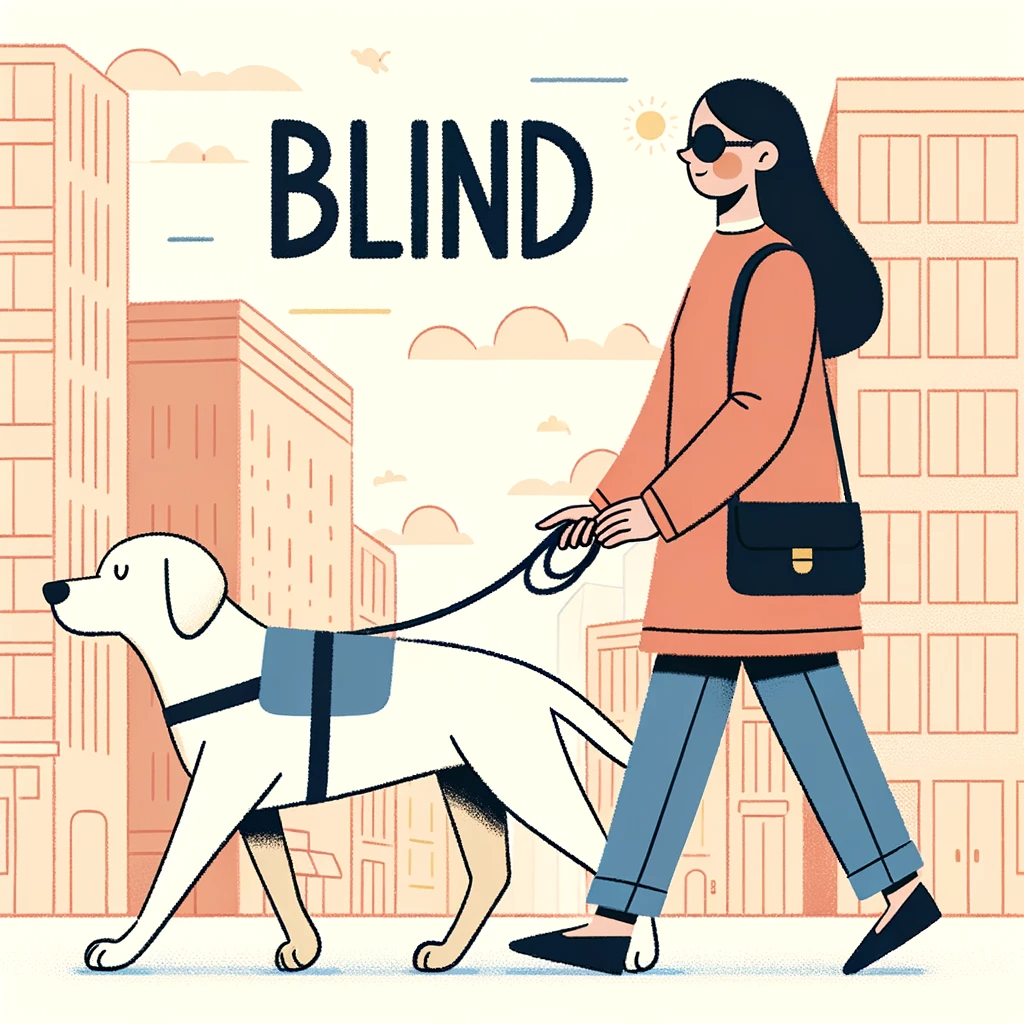Blind
Definition
Blind is an adjective, noun, and verb. As an adjective, it describes a person or animal lacking the ability to see or something done without knowledge or awareness. As a noun, it can refer to a covering for a window or an object that conceals something. As a verb, it means to deprive someone of sight or to prevent them from seeing or understanding.
Parts of Speech
- Adjective
- Noun
- Verb
Pronunciation
American English
- IPA Pronunciation: /blaɪnd/
- Respelling: BLYND
British English
- IPA Pronunciation: /blaɪnd/
- Respelling: BLYND
Etymology
The word "blind" originates from the Old English "blind," meaning "sightless" or "dark." It is of Germanic origin, related to the Dutch "blind" and the German "blind," both meaning "sightless."
Derivatives
- Blindly (adverb)
- Blindness (noun)
- Blinder (noun)
- Blinding (adjective/verb)
- Blindfold (noun/verb)
Synonyms
- Sightless
- Unseeing
- Oblivious
Antonyms
- Sighted
- Aware
- Perceptive
Usage
The term "blind" is widely used to describe the condition of lacking sight, or metaphorically, to refer to actions done without full knowledge or understanding. For example, "She has been blind since birth," or "They took a blind guess."
Related Terms
- Vision: The faculty or state of being able to see.
- Obscure: To keep from being seen or understood.
- Blindfold: A piece of cloth covering the eyes to block sight.
Detailed Definitions
Adjective
- Unable to see; sightless: Describes a person or animal without the ability to see.
- Example: "He has been blind since childhood."
- Done without sufficient knowledge or awareness: Refers to actions taken without full understanding or preparation.
- Example: "They made a blind guess at the answer."
Noun
- A covering for a window: Refers to a fabric or material that blocks light and visibility.
- Example: "They pulled down the blinds to darken the room."
- A concealed place used for hunting: Refers to a hidden area where hunters can wait unseen by their prey.
- Example: "The hunters set up a blind near the lake."
Verb
- To deprive someone of sight: Means to make someone temporarily or permanently unable to see.
- Example: "The bright light momentarily blinded her."
- To prevent someone from seeing or understanding something: Refers to blocking perception or comprehension.
- Example: "His anger blinded him to the consequences."
blind



🇨🇳 Mandarin (Chinese)
- 盲 (referring to the state of being unable to see)
- IPA Pronunciation: /mɑːŋ/
- Respelling: máng
- 盲目 (referring to lack of discernment or awareness)
- IPA Pronunciation: /mɑːŋ mʊ/
- Respelling: mángmù
🇮🇳 Hindi
- अंधा (referring to the state of being unable to see)
- IPA Pronunciation: /əndʱaː/
- Respelling: andhā
- अंध (referring to lack of discernment or awareness)
- IPA Pronunciation: /əndʱ/
- Respelling: andh
🇪🇸 Spanish
- Ciego (referring to the state of being unable to see)
- IPA Pronunciation: /ˈθjeɣo/
- Respelling: ciego
- Ceguera (referring to blindness or lack of awareness)
- IPA Pronunciation: /θeˈɣweɾa/
- Respelling: ceguera
🇫🇷 French
- Aveugle (referring to the state of being unable to see)
- IPA Pronunciation: /a.vœɡl/
- Respelling: aveugle
- Ignorant (referring to lack of discernment or awareness)
- IPA Pronunciation: /iɲɔʁɑ̃/
- Respelling: ignorant
🇸🇦 Modern Standard Arabic
- أعمى (referring to the state of being unable to see)
- IPA Pronunciation: /ʔaʕmaː/
- Respelling: a'amaa
- غافل (referring to unaware or negligent)
- IPA Pronunciation: /ɣaːfil/
- Respelling: ghāfil
🇧🇩 Bengali
- অন্ধ (referring to the state of being unable to see)
- IPA Pronunciation: /ɔndho/
- Respelling: ôndho
- অবোধ (referring to unaware or ignorant)
- IPA Pronunciation: /ɔbodh/
- Respelling: ôbôdh
🇷🇺 Russian
- Слепой (referring to the state of being unable to see)
- IPA Pronunciation: /slʲepoj/
- Respelling: slepoy
- Невежественный (referring to ignorant or unaware)
- IPA Pronunciation: /nʲɪvʲɪˈʐɛstvʲɪnːɨj/
- Respelling: nevezhestvennyy
🇵🇹 Portuguese
- Cego (referring to the state of being unable to see)
- IPA Pronunciation: /ˈse.ɡu/
- Respelling: cego
- Inconsciente (referring to unaware or negligent)
- IPA Pronunciation: /ĩ.kõʃ.ˈsjẽ.t͡ʃi/
- Respelling: inconsciente
🇮🇩 Indonesian
- Buta (referring to the state of being unable to see)
- IPA Pronunciation: /buta/
- Respelling: buta
- Tidak sadar (referring to unaware or unconscious)
- IPA Pronunciation: /tidak sadaʁ/
- Respelling: tidak sadar
🇩🇪 German
- Blind (referring to the state of being unable to see)
- IPA Pronunciation: /blɪnt/
- Respelling: blind
- Ahnungslos (referring to clueless or unaware)
- IPA Pronunciation: /ˈaːnʊŋsloːs/
- Respelling: ahnungslos
🇯🇵 Japanese
- 盲目 (referring to the state of being unable to see)
- IPA Pronunciation: /moo.moku/
- Respelling: mōmoku
- 知らない (referring to unaware or ignorant)
- IPA Pronunciation: /ʃiɾa.nai/
- Respelling: shiranai
🇻🇳 Vietnamese
- Mù (referring to the state of being unable to see)
- IPA Pronunciation: /muː/
- Respelling: mù
- Không biết (referring to unaware or ignorant)
- IPA Pronunciation: /kʰoŋ bjəːt/
- Respelling: không biết
🇰🇷 Korean
- 맹목 (referring to the state of being unable to see)
- IPA Pronunciation: /mɛŋ.mok̚/
- Respelling: maengmok
- 모르는 (referring to unaware or ignorant)
- IPA Pronunciation: /moɾɯnʌn/
- Respelling: moreuneun
🇹🇷 Turkish
- Kör (referring to the state of being unable to see)
- IPA Pronunciation: /kœɾ/
- Respelling: kör
- Bilgisiz (referring to unaware or ignorant)
- IPA Pronunciation: /bilɟiziz/
- Respelling: bilgisiz
🇵🇰 Urdu
- اندھا (referring to the state of being unable to see)
- IPA Pronunciation: /əndʱaː/
- Respelling: andhā
- بے خود (referring to unaware or unconscious)
- IPA Pronunciation: /beː xud/
- Respelling: be-khud





